New Constitution-development encyclopedia Zulayho Sultonaliyeva, daughter of Sultanaliyeva Zulayho Sherzod Jizzakh branch of the National University of Uzbekistan named after The direction of economy (networks and sectors), 131-23 group student Abstract. The new Constitution is a symbol of development. Because the Constitution is not a frozen law, but it should be constantly updated according to the economic, social and political changes. Key words: Constitution, development, state, laws, strategy, Renaissance, referendum. Changing the constitution was the solution, because today everything is developing. As our economic, social and political views are changing in turn, therefore our laws had to change as well. If in any country human value is glorified, if human interests are put above all else, the development of that country will accelerate and at the same time there will be development. Under the consistent laws implemented in the new Constitution, a person, his rights and freedoms, and all his legal interests are embodied. It is also important that norms aimed at the formation of an active civil society and the further development of the institution of public control are introduced into our updated Constitution. In addition, the issue of public control over the formation of the state budget and its execution is specifically reflected in the new article 122. From this we can see how much importance is attached to our development today and great efforts are being made for the development of our development. In his speech, the head of state noted that the interests of all strata were taken into account in the updated constitution, that the population actively participated in its development, and that it was adopted through a referendum, which is proof that this document is a truly people's constitution. Millions of our compatriots took an active part in the public debates held from the discussion of the draft of our constitution to its adoption. From this point of view, we have every reason to say that the real author of our new Constitution was our people. The most important thing is that we will never turn back from the path of our reforms, we will only move forward based on the new system of "man - society - state", - said President Shavkat Mirziyoyev. In our new constitution, the value of human being is put first, of course, development will improve in such a country. The future of our country, its future, development and the prosperous life of our people directly depend on the newly adopted Constitution of the Republic of Uzbekistan. The successful results of large-scale reforms that have taken place in our republic over the past six years are widely recognized by official circles abroad. A well-thought-out long-term program of reform, democratization, liberalization and modernization of our society is attracting the attention of statesmen and politicians. The new Constitution created the political and legal basis for the implementation of the strategy of New Uzbekistan and determined the priority directions for the further development of the state and society at the historically important stage of the development of national statehood. The fact that Uzbekistan is a sovereign, democratic, legal, social and secular state in the first article of our updated Constitution has become historically significant. In our updated Constitution, we can see that every article is clearly and concisely explained and elaborated. These changes and additions are aimed at the more stable development of Uzbekistan, strengthening its potential to resist various threats. The main goal of the systematic reforms implemented in our country is to glorify human dignity, establish a people-friendly social state, and ensure justice and the rule of law. It is good that New Uzbekistan, which is creating the foundations of the Third Renaissance, has made great progress in this way in a short period of time. We are seeing the results of all these reforms. This also shows the rise of our development. The most important thing is that everyone sees and feels such changes in their daily life. In the future reforms, it is aimed to further improve these achieved results and create additional conditions for people. It is worth noting that the strong legal foundations of the reforms at the new stage of our development, founded by our President, are in full compliance with the priority principles and rules laid down in our Constitution. many priority principles, such as loyalty to established human rights, high responsibility to current and future generations, commitment to democracy and social justice, ensuring that citizens live a decent life, are manifested today as an example of changes in the life of every person. The results of the reforms covering all sectors and industries are visible in any region of our country, including in the villages and hamlets of the most remote districts. Today, no one can deny that people are actually enjoying the rights and freedoms guaranteed by the Constitution. The decisive factor for this is the fact that the head of our state, who is the author of vital initiatives and noble ideas, who sets the priorities, takes great responsibility for their implementation, devotes his whole existence to the interests of the nation and the country. is doing. Effective, people-oriented state administration and a strong parliament are necessary for people to live comfortably and for the stable development of the country. Another important aspect of our updated Constitution is that our General Assembly aims to establish a strong parliament, a compact and responsible government, and an independent and fair judicial system in order to build a people- friendly state. According to him, the powers of the Legislative Chamber and the Senate have been significantly expanded, duplications in the work of the two chambers have been eliminated, and the sphere of responsibility of each has been clearly defined. As a result of establishing a direct dialogue between the people and the state authorities, the attitude towards the changes implemented by the initiative of the state authorities and management bodies has fundamentally changed. The policy of transparency has led to the prompt response of public bodies to the public opinion and the prompt resolution of existing socio-economic problems. If we don't change our constitution today, if we don't adapt it to the norms that meet the requirements of the time, we will not be able to get rid of the "rust" that has corroded our society, besides, it will take many years for us to become a competitive, modern, most advanced country. The goal is to become a competitive, modern, most advanced country, this is not a myth, we must strive for this reality. The human factor plays an important role in the society we are building, which is based on the priority of human interests. The Constitution is a huge historical success of the Uzbek people during the years of national independence. The Constitution of the Republic of Uzbekistan formed the legal basis of our independent statehood, ensured the country's inclusion in the ranks of sovereign states, laid the main foundation of our freedom, the cornerstone that gave each of us the pleasure of living in a legal, democratic and open civil society. Summary: It should be noted that the updated Constitution will be a solid legal basis and a reliable guarantee for the long-term development strategy of our country, the prosperous life of our country and people tomorrow. The new Constitution will help our development. The fact that the legal norms related to the social protection of the population are clearly disclosed in the new Constitution is a proof of the greatness of the human value. Where human dignity is glorified, there will surely be an ascension. References: 1. https:// daryo.uz 2. https://kknews.uz 3. https://religion.uz 4. https://buxdu.uz
Category Archives: CHAOS
Essay from Marjona Shayimova
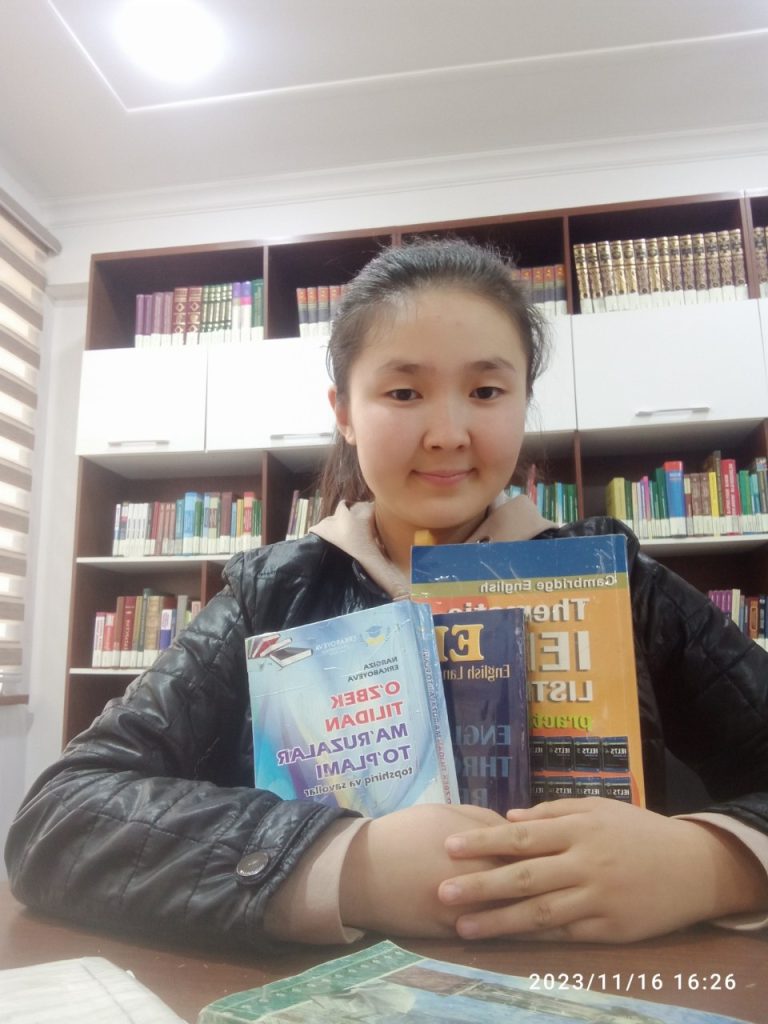
Achieving dream and purpose
In life, every person has goals and dreams, and they always move towards their dreams and goals. First of all, a person should clearly define his dreams and goals, and make a goal in life, not a dream. Because you can achieve the goal 90% of the time depending on the effort.
Also, you need enough self-confidence, this is very important. The paths leading to any dream and goal will not be easy. These roads consist of ups and downs. You can get tired and fall down along the way, and this should be taken lightly. However, most teenagers feel depressed or blame someone else when they fail an exam. This is not a good habit or situation, at that time a person should analyze himself/herself and learn from this mistake. Mistakes develop a person. You should never stop trying. No one becomes a successful person by themselves. If we look at successful people like Steve Jobs or Elon Musk, the way to reach the current level was not easy, of course they also fell once but did not stop. Because it would not have reached this level when they stopped.
What level are you at now and what level do you want to be in the future? Act based on this because the clock is ticking, days are passing, months are passing years and your parents need to see your success. Because these people are the reason why you see this world. Therefore, it is necessary to act as soon as possible.
Marjona Shayimova Utkirjon’s daughter was born on May 13 2006 in Nurabod, in the Samarkand region.
Essay from Feruza Muzaffarova
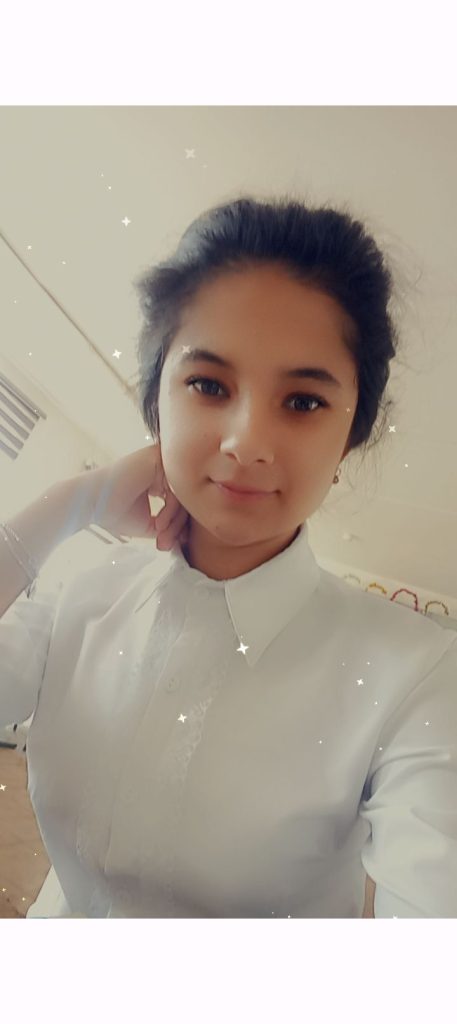
O`TKIR HOSHIMOVNING “IKKI ESHIK ORASI”ROMANIDA QAHRAMONLAR OBRAZI TALQINI. Muzaffarova Feruzabonu Yodgor qizi. Buxoro psixologiya va xorijiy tillar instituti talabasi. muzaffarovaferuzabonu2com@gmail.com Annotatsiya: Ushbu maqolada O`zbekistonning taniqli yozuvchisi,adib O`tkir Hoshimovning “Ikki eshik orasi” romani qisman tahlil etilgan,asar qahramonlarining hayot yo`li,ijobiy va salbiy xarakterlari,inson umrining murakkabligi haqida so`z yuritilgan. Kalit so’zlar: insonparvarlik, “Ikki eshik orasi”, qahramon, pafos, roman. ИНТЕРПРЕТАЦИЯ ОБРАЗА ГЕРОЕВ В РОМАНЕ ОТКИРА ГАШИМОВА "МЕЖДУ ДВУМЯ ДВЕРЯМИ". Аннотация: В данной статье частично анализируется роман известного писателя Узбекистана Откира Гашимова «Между двумя дверями», обсуждаются жизненный путь героев произведения, положительные и отрицательные персонажи, сложность человеческой жизни. Ключевые слова: гуманизм, «Между двумя дверями», герой, пафос, роман. INTERPRETATION OF THE IMAGE OF THE HEROES IN THE NOVEL "BETWEEN TWO DOORS" BY OTKIR HASHIMOV. Annotation: In this article, the novel "Between Two Doors" by Otkir Hashimov, a well-known writer of Uzbekistan, is partially analyzed, the life path, positive and negative characters of the heroes of the work, and the complexity of human life are discussed. Key words: humanitarianism, "Between Two Doors", hero, pathos, novel. Although O`tkir Hashimov's novel "Between Two Doors" was written in 1986, it is one of the masterpieces that readers have not lost their hands to today. A reader who reads the work will have a strange feeling in his heart. In the novel, the scenes of the bloody war of the last century are illuminated by the example of the fate of people. At the same time, through the system of events in the play, it is said that the war left an indelible mark on the hearts of every family member. There is a saying in the work, "Between the truth and the lie - four latitudes". This single proverb compares the difference between the change of a person's destiny for the better or for the worse to four steps. This is characterized by the writer's deep understanding of all aspects of life, skillfully interpreting this fact in the case of the heroes of the work. At the same time, there are four latitudes between a person's eyes and ears. There is a saying in our people, "Believe what you see, not what you hear." This is also a sign that our wise people have tasted the bitter and sweet life and that they have come to a deep meaningful conclusion. The skill of the writer is that the person who reads the work feels the inner experiences of the hero. When they cry, he cries, and when they rejoice, he rejoices with them. The scenes of life depicted in the work, interpersonal relations, their dialogues, as well as the author's own artistic style are distinguished by their naturalness and sincerity. The compositional structure of the novel is also unique. The writer skillfully connects the stories of the characters in it. Such a poetic method chosen for the image requires high skill from the writer. In the character of Muzaffar in the work, one can see the image of a sincere person who has experienced many difficulties. Especially, the image of the elder Arif gives the novel its charm. His humanitarianism, the reputation he gained among people, and his strength to overcome difficulties in the most difficult moments will be imprinted in the reader's memory. When talking about the image of Robiya, the reader imagines the qualities typical of a real Uzbek girl: beautiful, hardworking, sincere, with long hair. Fate does not smile at Robiya. Robiya, orphaned by her mother since she was young, grows up under the care of her father. How complicated the fate of people in the work is can be seen in the image of Robiya alone. The character of Kimsan, the only son of Black aunt, who embodies the image of a truly brave, brave, selfless Uzbek boy, which increases the value of the work. Through the image of Kimsan, we can see that the writer clearly expressed the image of loyalty, who literally sacrificed himself at the hands of the Nazis to protect his country, family, and his beloved. Through the image of Kimsan, we can learn how dangerous war is and its consequences. Some of the characters in the work have a positive place in the reader's mind with their honesty, conscience, and faith typical of the Uzbek people, but Umar, like Zakunchi, is strict, unscrupulous, and will do anything for his own benefit. The unattractive, unpopular person occupies a negative position. In short, the reader reads each work of the writer with great interest and enthusiasm. O`. In Hashimov's novel "Between Two Doors", the emotions of the characters acquire a negative meaning. The reason is clear, war is a great burden for the people. In the age of technology, we young people should be proud of our endless opportunities to read our golden heritage and spiritual masterpieces whenever we want, under whatever conditions we want. In such a time, let's not get tired of stepping towards new opportunities in New Uzbekistan, contributing more to the development of my country, and let's use all our opportunities in this way. Times pass, people change, development reaches its climax, but it is not surprising that O`tkir Hashimov's novel, like other classic works, remains in the public eye! References: 1. O`. Hoshimov. Between two doors, "Nurli Dunya" publishing house, 2022 2. Bakhronova, M.A., & Sayfullayeva M. Dictation as language learning tool. Pedagogy and psychology in the modern world: theoretical and practical research 2022. B.-252-258. https://in-academy.uz/index.php/zdpp/article/view/1812
Essay from Tuliyeva Sarvinoz
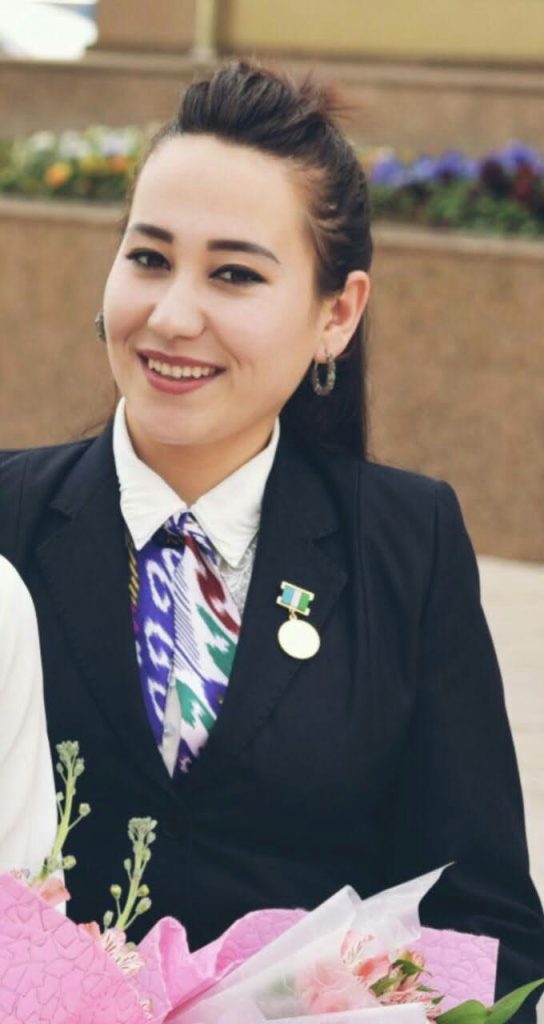
Our society is in the hands of young people! The growing young generation is the future of our society. Parents should lay the foundation for their education, language learning, and professional development. They should be an example to their children. There is a saying in our people: "A bird does what it sees in its nest." Of course it is. Parents are role models for their children. We found it permissible to give examples from events in life. A friend of mine from a long time ago used to take all his pain from his little child as a result of misunderstandings in his family, relations between mother-in-law and daughter-in-law. His child was still two years old. The quarrels and passions that took place at home were getting imprinted in the child's memory. He was growing up as a timid, shy, lonely child... Big mistakes of parents in child rearing started to surface. The result of their mistakes knowingly and unknowingly hit them like a slap in the face in the example of their children... When the child reaches adulthood, he does not respect his parents, gets angry at the slightest problem, and fights with his friends on the street every day. His life was meaningless and fruitless... You definitely don't want to get into this situation. But such mistakes are made in case of ignorance. Dear parents, let's open our eyes. Let's not ignore the future of our children. The future of our society is in the hands of our children and youth! They should be given knowledge in every field, be an example, read books together, and have useful activities. Then the child develops. Why does a child born in a family of intellectuals necessarily get a higher education? Why does a child born in an artistic family become an artist? So?! Because such talents and abilities are a process that passes through genes. If you want to change the genes of your ancestors, first change yourself. Read, develop, gain knowledge, set goals. Action and action. Let's not forget that it is in the hands of parents to form an educated, intelligent class for our society! Tuliyeva Sarvinoz The owner of the state award named after Zulfiya. Teacher of native language and literature at Shaikhontohur District Vocational School of Tashkent city.
Story from Shahnoza Ochildiyeva
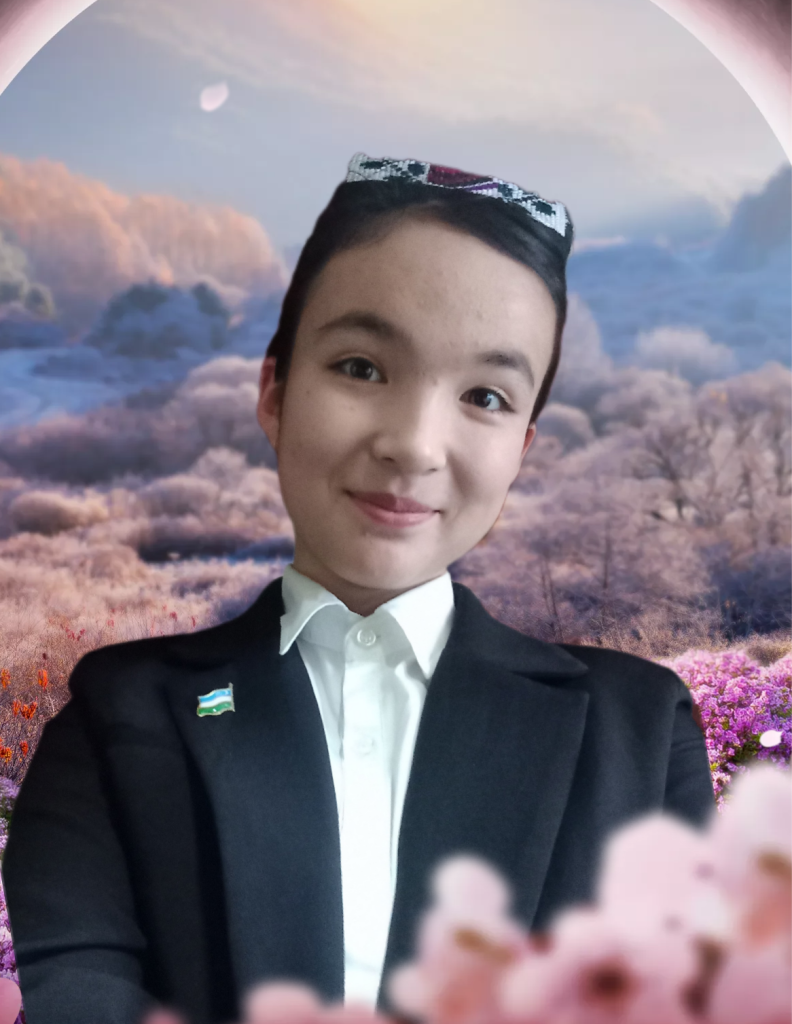
Fresh dream
The smell of soil, the smell of ground...Oh , so lovely and dear this smell. Especially, the soil of native land is closer to the heart. Repentance, the sun of homeland also seem special. After all, only one sun shines on the whole world. But, as if the sun caresses the people with its rays, looks at them with a special smile.
Barno stopped in the modern airport which crowded with people. Looked around one by one . The words resonated in her native language sounded very pleasant to her ears. Barno was coming back to Uzbekistan for missing her sister and village very much. Although she wanted to wander through Tashkent which is capital of Uzbekistan , she decided to go to Surkhandarya. She promised to return again to Tashkent before went to Surkhandarya. The roads were far away... Barno remembered the past, leaning his face against the window of the car.
Barno was born in Surkhandarya region. She grew in anticipation of the scorching rays of the sun. Maybe so that, she was so beautiful girl like so many girls of Surkhandarya. Her childhood was very happy. She saw no grief, no worries. But at the age of 17, she lost his father and a year later her mother. They died.
She and her sister started living with their old grandmother. Barno's dream of being student at university also did not come true. The main reason for this is that, after finishing from school , she went to work abroad with aunt Robia who was both their neighbour and her mother's closest friend. Her sister was 10 years old and her grandmother was old. Moreover, it was also difficult to find a job. They hadn't got any relatives who can help, almost. Five years ago she left her homeland with deep sadness in his heart.
She began working with her aunt in a confectionery factory. She worked a lot to earn much money. It will be much more difficult, if you do not have a person and a home that wait you when you return late from work. Sometimes, when Barno came from work, she was weeping remembering her country, village and loved ones. She would stop weeping, thinking that she would hurt her parents who were looking from the skies. She worked hard and sent a lot of money to her grandmother. One day, When she was talking with her sister on the phone, her sister said that there were many new developments in New Uzbekistan, and youth had different chances to do business. Barno had hope in her heart. She decided to come back to her home. She wanted to live happy in her country.
She remembered her stories in her life. When she got up they had almost arrived at the destination. The taxi entered into the street which known for her. Barno was over the moon.
As long as, her sister and grandmother were waiting without sleeping. Barno was so happy to see them, to return to her country. That situation was impossible to describe in words. She hugged her grandma and sister with her heart, not with her hands. After she rested for few days, she began her work. "We always support youth who had a talent in their heart" they said to Barno, and they gave credit in very fast opportunities. Barno created her own confectionery factory in her village. Apart from she called it "Fresh dream" . This name was similar to her life and feelings . The "Fresh dream" factory was opened in a lot of areas of her country. Her factory and her sweets were famous and lovely for everyone.
**********
Barno was invited to the forum of youth and students of Uzbekistan. The main reason for this is that she was one of the best business girl of her country. Now she was not an unhappy girl but one who came back to her homeland with longing for her country. She was really happy!
Shahnoza Ochildiyeva
Uzbekistan
Poetry from Niginabonu Amirova
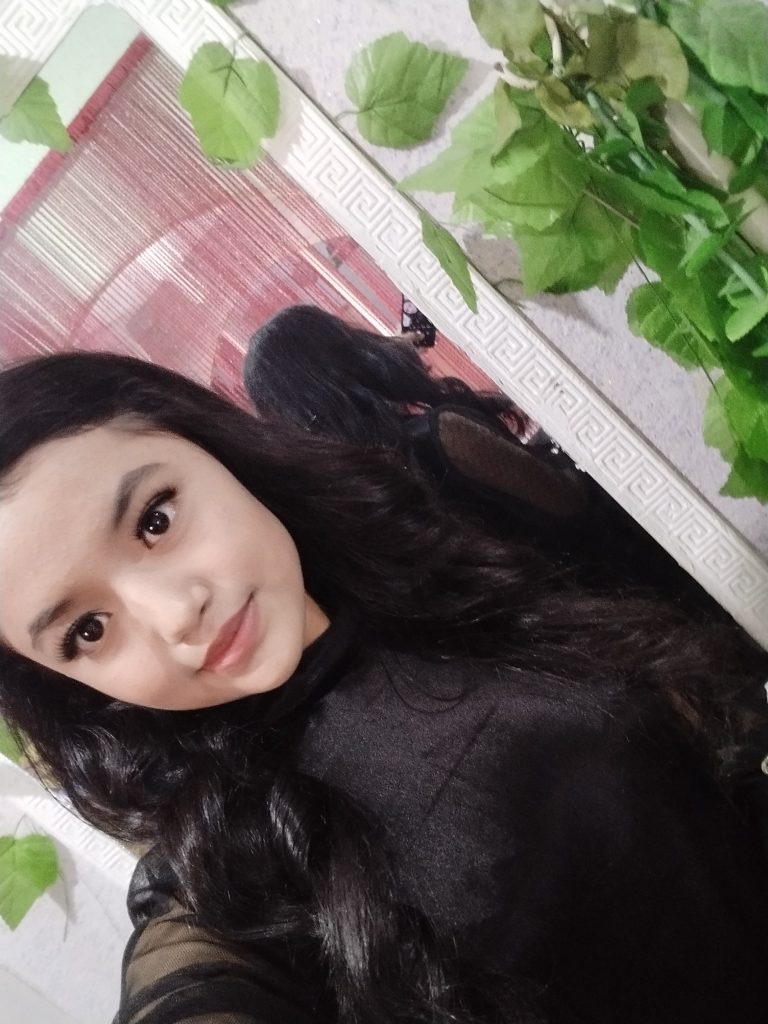
Sports A healthy body is a healthy mind. Great grandfathers say. This is the proof of his words Many sages have seen. If you get up and run in the morning, Even if you swim in the water with friends You will be healthy Your eyes wonʼt be wet. You will grow up Both strong and gentle. Canʼt be an obstacle Even the mountain, and also nowhere. The disease cannot reach to you It doesnʼt go your way. You will get good health Take the opportunity.
Poetry from Zuhra Ruzmetova
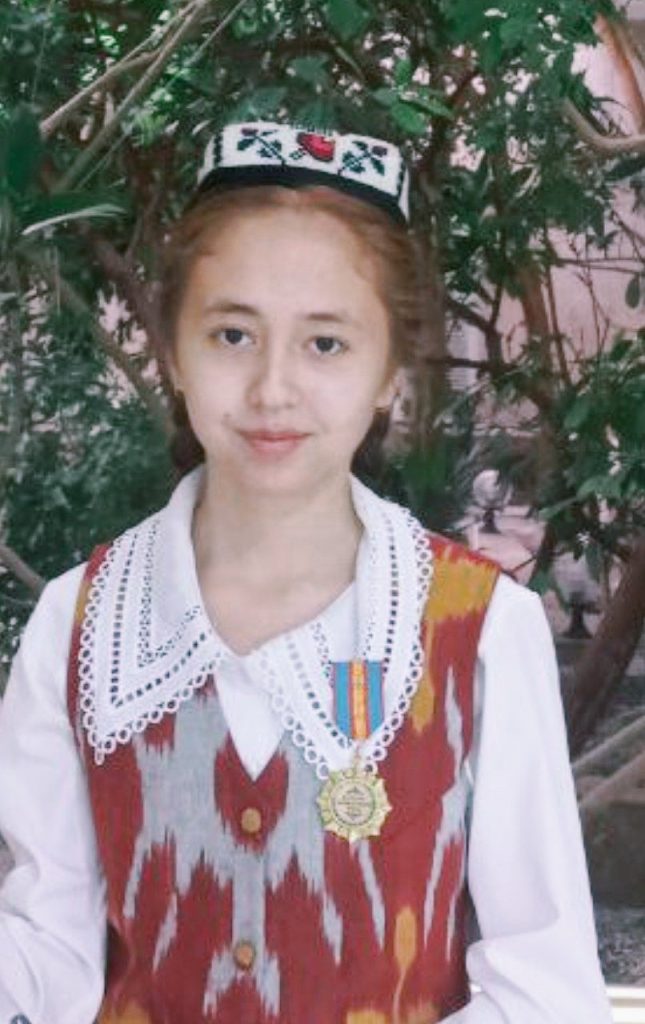
🌹My loving mother🌹
My mother is my greatest asset in the world. She supports me every step of the way. Encourages by my side day and night in any situation. My mother is the symbol of love and sincerity for me. She is ready to give us everything but she does not ask for anything in return. When I m afraid of the dark she becomes my light and saves me from that darkness. If I can't sleep at night she doesn't leave my side until I fall asleep.
Most importantly my mother encourages me to be thorough in every way and to learn. Every mother is a special person for her children. On my days of failure my mother always tells me to try again until you reach your goal you gain experience from the knowledge you have gained due to failure. My mother is the most beautiful woman in the world. Mothers always come to help even if they are not with us my mother is such a person that she can replace everyone but no one can replace her. If they told me to hug the world I would go and hug my mother. If I come into the world once I would like you to be my mother a thousand times more. I am proud to have a mother like you. You are the number one person for me. I love you so much. My dear mother.
A mother is a jocular and kind person who gives life lessons. A coach who always shows the right way who can always help young and old a like. A loving mother who pleases everyone in the family. Mother is a precious stone in everyone's life. She is the main source of happiness for the child. It is probably impossible to find a mother who does not love her child with all her heart. Even though my mother is not physically strong she is able to overcome any obstacles for her life and family.
Mothers heart and mothers love are waves like an incomparable ocean. The first melody heard by the baby is the melody that sounds in the mother's heart with a soft voice. When we mention this holy world my loving mother who is the only one dear to me in the world is incarcerated before my eyes. My mother protects me when I stumble and gives her advice. My mother is the person I trust the most she always listens to me and supports me. They cheer me on when I succeed and support me when I fail. I love you very much dear mother.
✍️Ruzmetova Zuhra
Ruzmetova Zuhra Vyacheslavovna November 30, 2006 I was born Uzbekistan in the city Urgench Khorezm region. My poets have been recognized in more 10 countries.I am winner of competitions of more 100 national and international organizations. I am holder of badge "For the international Services"🎖by the bi wing poets writers association. I have many future dream goals.
